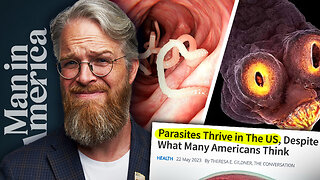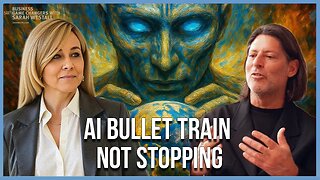Premium Only Content

Episode 3214: Go ahead and Weep: The Gift of Compunction
www.catholic-reboot.com
Nightly Zoom Coordinates for Rosary:
Meeting ID: 865 8978 0399
Passcode: Wjjv4960!
Speak Lord for your Servant is Listening
Book Recommendation of the Day
One of the best and most influential books on the Seven Sorrows of the Blessed Virgin Mary is The Glories of Mary by Saint Alphonsus Liguori.
Here are a few reasons why it’s especially strong, followed by a couple of other noteworthy works (by saints or popes) in this area:
Why The Glories of Mary stands out
• Saint Alphonsus devotes an entire part of the work to the Seven Sorrows, with detailed reflections.
• He draws on the writings of earlier saints and Church Fathers, combining solid theology with deep devotion.
• The meditations help one enter spiritually into Mary’s sufferings in connection with Christ’s Passion, which is exactly the point of the Seven Sorrows devotion.
In yesterday’s episode, I made some comments regarding Charlie Kirk’s discussion with a young Protestant student and his explanation of the Gospel verse from St. Matthew, chapter 16, verse 18:
“And I say to thee: That thou art Peter; and upon this rock I will build my church, and the gates of hell shall not prevail against it.” (Douay–Rheims)
I want to be clear: I have great respect for much of what Charlie Kirk has accomplished. He has shown remarkable courage in defending his country at a time when communism and anti-American sentiment are flourishing. He also chose to confront the problem at its root: the indoctrination of young minds taking place on college campuses across the nation. For that, he deserves recognition.
However, when he begins to present a form of Protestantism as though it carries true authority, this becomes spiritually dangerous perhaps even more so than the spread of harmful ideologies like communism. For while social constructs affect how we live together, spiritual constructs affect eternal salvation.
Sadly, many today find discussions of religion tedious, and the history of the Faith even more so. This is one of the great crises of our age: countless Catholics neither know their faith nor its history. If they did, they would more readily recognize the tragic errors of Protestantism, which not only fractured Christendom but shaped and distorted much of modern society.
Once you walk away from the authoritative teaching of the Catholic Church, you are left adrift. That is why there are now tens of thousands of Protestant denominations none with true authority. Yet in the name of “ecumenism,” many Catholics act as though they all do. In doing so, Catholics have abandoned the battlefield, ceding ground to voices that do not and cannot speak with the authority of Christ’s Church.
We see the result in everyday speech: Catholics say, “I want to believe” or “I believe,” only to follow it with opinions that are neither authoritative nor Catholic. In reality, it does not matter what any individual professes apart from the Church. What matters is whether one has the authority to teach, preach, and promote the Gospel as Christ entrusted it. The answer outside the Church is simple: no.
This is why we must stop allowing Protestant voices to dominate the battlefield while the Catholic Church is pushed aside. We need Catholics with the courage of Charlie Kirk’s boldness only directed not toward Protestant errors, but toward proclaiming the fullness of truth entrusted to the Church. We need Catholics who are strong, determined, and willing to teach the Faith vigorously.
Consider the example of St. Margaret Clitherow. When she once found a Protestant Book of Common Prayer in her home, she threw it into the fire, declaring that heresy had no place under her roof. In our times, such an action would likely be condemned as hateful. But hatred toward what? Toward man? No her zeal was rooted in love of truth and hatred of error, which leads souls astray.
We must recover that same zeal: firm in truth, compassionate toward souls, and unafraid to defend the authority of the Church Christ Himself established.
The Gift of Compunction
Introduction: What is Compunction?
Among the great themes of the Desert Fathers, one that is rarely spoken of today but was central to their spirituality is compunction (penthos in Greek). Compunction means a piercing of the heart a godly sorrow that leads to repentance, humility, and union with God.
The Desert Fathers believed that without compunction, the soul remains hard and distracted. With compunction, the soul is softened, humbled, and filled with divine grace. They called this the gift of tears — not despairing tears, but tears that purify and renew.
Segment 1: Sayings of the Desert Fathers
The Fathers treasured compunction as a high form of prayer:
• Abba Isaac taught:
“A man who possesses the gift of tears is greater than one who raises the dead.”
Because raising the dead affects the body, but tears of repentance heal the eternal soul.
• Abba Poemen gave a vivid image:
“The word of God is soft, and our heart is hard; but if a man hears the word of God often, his heart will be opened by the fear of God, as water wears away stone.”
Just as water slowly shapes stone, God’s word and prayer gradually soften the hardest heart until it weeps in compunction.
• Evagrius of Pontus described compunction as sorrow that leads to peace:
“Compunction is mourning that leads to joy. He who sorrows for his sins finds rest in God.”
For the Desert Fathers, compunction was not an occasional feeling, but a continual disposition — a heart always sensitive to God, always quick to repent, always tender toward divine things.
Segment 2: Why This Matters for Us Today
Our culture avoids sorrow at all costs. We numb pain with distraction, entertainment, and medication. Yet in this avoidance, we lose something essential: the capacity to grieve over sin and to mourn for God.
• Indifference to sin has hardened many Catholics. Mortal sins are dismissed as “mistakes.” Few weep for what crucified Christ.
• Shallow optimism tells us never to mourn, but the Desert Fathers knew that holy sorrow is the seed of true joy.
• Lack of compassion blinds us to the suffering of others. Without compunction, the heart grows cold and self-centered.
The Desert Fathers show us that tears are not weakness, but strength. They cleanse the soul, restore humility, and awaken charity.
Segment 3: Remedies and Practices from the Fathers
The Fathers did not only speak of compunction; they cultivated it through daily discipline:
1. Memento Mori — Remember Death
Abba Macarius said:
“If we keep death before our eyes every day, we will never sin.”
The constant remembrance of death humbles the heart and leads to compunction.
2. Meditation on the Passion of Christ
The Fathers gazed upon the Crucifix and saw the cost of sin. Each wound of Christ became a call to repentance.
3. Praying the Psalms of Lament
Psalm 50(51): “Have mercy on me, O God, according to Thy great mercy.”
Psalm 41(42): “My tears have been my bread day and night.”
These psalms gave words to their sorrow and opened their hearts to tears.
4. Weeping for the World
Their tears were not only personal. They mourned for sinners, for the lost, and for the world’s salvation. Compunction became intercession.
5. Fasting and Vigil
Acts of penance humbled the flesh and disposed the soul to sorrow for sin.
These practices opened the way for the gift of tears not forced, but received as a grace.
Segment 4: The Fruits of Compunction
The Fathers saw compunction as transformative:
• Humility — Tears prevent pride, for the weeping soul remembers its dependence on God.
• Purity of Heart — Compunction cleanses the soul, preparing it for prayer and contemplation.
• Charity — One who weeps for his own sins easily weeps for others, becoming merciful and compassionate.
• Joy — Though born of sorrow, compunction leads to divine consolation. As Christ promised: “Blessed are they that mourn, for they shall be comforted.” (Matthew 5:5)
For the Fathers, the Christian life was not measured by visions or miracles, but by whether one had received the grace of compunction.
Conclusion: Tears that Save
The Desert Fathers remind us that compunction the piercing of the heart, the gift of tears is not a marginal devotion but the heart of conversion.
In an age of coldness and distraction, we must rediscover this gift. To weep for our sins is to begin to see with God’s eyes. To weep for others is to share in Christ’s compassion.
As Abba Isaac said, “The man who possesses the gift of tears is greater than one who raises the dead.” For in those tears, the soul is raised from death to life.
Epistle – Judith 13:22–25
"Blessed art thou, O daughter, by the Lord the most high God, above all women upon the earth. Blessed be the Lord, who made heaven and earth, who hath directed thee to the cutting off the head of the prince of our enemies. Because he hath so magnified thy name this day, that thy praise shall not depart out of the mouth of men who shall be mindful of the power of the Lord forever."
Reflection on the Epistle
The Church applies to Mary these words originally spoken of Judith, who by her courage delivered Israel. Just as Judith triumphed over Holofernes, so Mary, through her faith and sorrows, shares in the victory of her Son over Satan.
Mary is blessed above all women not because her life was free of suffering, but because she embraced suffering with perfect fidelity. In her we see the mystery of redemptive suffering: the sword that pierced her heart did not destroy her, but made her the Mother of all who stand at the foot of the Cross.
For traditional Catholics, this is a powerful reminder that suffering, when united to Christ, is not meaningless. Our Lady teaches us to embrace the cross of daily life with courage and trust, knowing that God magnifies His power in our weakness.
Gospel – John 19:25–27
"Now there stood by the cross of Jesus, His mother, and His mother’s sister, Mary of Cleophas, and Mary Magdalene. When Jesus therefore had seen His mother and the disciple standing whom He loved, He saith to His mother: Woman, behold thy son. After that, He saith to the disciple: Behold thy mother. And from that hour, the disciple took her to his own."
Reflection on the Gospel
Here we are given the deepest revelation of Mary’s role. At the foot of the Cross, she is not only the sorrowful Mother of Christ but the new Eve, the spiritual Mother of all the redeemed. In giving Mary to John, Christ entrusts her to the Church, and the Church to her.
Her presence beneath the Cross teaches us three things:
1. Fidelity: She did not flee, though nearly all others did.
2. Compassion: Her heart was united to Christ’s, suffering with Him in perfect love.
3. Motherhood: She became our Mother, interceding for us in our trials.
This Gospel calls us to stand with Mary at the foot of the Cross in our own lives. We must not abandon Christ in times of trial. Instead, we draw strength from Our Lady’s example, placing ourselves under her mantle.
Feast of the Seven Sorrows of the Blessed Virgin Mary
The Seven Sorrows devotion dates back to the 13th century and was spread by the Servite Order. It recalls seven key sorrows in Mary’s life:
1. Simeon’s prophecy in the Temple.
2. The flight into Egypt.
3. The loss of the Child Jesus in the Temple.
4. Meeting Jesus on the way to Calvary.
5. Standing at the foot of the Cross.
6. Receiving His lifeless body.
7. Placing Him in the tomb.
Each sorrow pierced her immaculate heart, yet she embraced them in perfect faith. Her sorrows are our consolation, because she shows us how to suffer with love, courage, and hope in God.
Application for Today
• Stand at the Cross: Like Mary, do not flee suffering but embrace it in union with Christ.
• Imitate her fidelity: In a world quick to abandon truth, be steadfast in faith.
• Invoke her intercession: Call upon the Sorrowful Mother in times of trial; she understands every grief.
• Teach devotion to her sorrows: This feast reminds us to pray and meditate on her sufferings, especially in the Rosary of the Seven Sorrows.
Conclusionary Prayer
O Sorrowful Mother, whose soul was pierced by seven swords, teach us to unite our sufferings with thine and with those of thy Divine Son. May we never flee the Cross but remain faithful, standing beside thee at Calvary, until we too are led into the joy of the Resurrection.
Our Lady of Sorrows, pray for us.
Sacred Heart of Jesus, have mercy on us.
Immaculate Heart of Mary, console us.
Episode Theme:
On the Feast of the Seven Sorrows of Our Lady, we learn that true fidelity means standing at the Cross with Mary, offering our sorrows to God, and living as grateful children of the Mother given to us at Calvary.
-
 13:25
13:25
Nikko Ortiz
1 day agoWorst Karen TikTok Fails
9.44K10 -
 40:24
40:24
The Connect: With Johnny Mitchell
2 days ago $18.41 earnedInside The WORST Drug-Infested Slums Of Medellin, Colombia
56.6K28 -
 4:14
4:14
GritsGG
13 hours ago2 Warzone Easter Eggs! How to Find Them EASILY!
4.8K -
 LIVE
LIVE
Lofi Girl
2 years agoSynthwave Radio 🌌 - beats to chill/game to
229 watching -
 1:45:43
1:45:43
Man in America
14 hours agoThe DISTURBING Truth About Parasites — Live Q&A w/ Dr. Jason Dean
71.1K38 -
 7:13:47
7:13:47
SpartakusLIVE
10 hours ago#1 Mountain of Muscle with HUGE Legs saves your weekend from complete BOREDOMNight HYPE
42.3K1 -
 47:42
47:42
Sarah Westall
11 hours agoFreedom or Slavery? AI will Change Everything w/ Trump Senior Advisor Marc Beckman
56.7K12 -
 2:23:20
2:23:20
vivafrei
17 hours agoEp. 285: Visa Revocation No-Go! Sortor Arrested! Ostrich Crisis! 2A Win! Comey Defense & MORE!
115K108 -
 5:55:11
5:55:11
CassaiyanGaming
8 hours ago🟢LIVE - VISITING GOOB LAGOON! - Will They Rip Me Off?!? Waterpark Simulator
41.8K4 -
 5:42:21
5:42:21
EricJohnPizzaArtist
6 days agoAwesome Sauce PIZZA ART LIVE Ep. #64: Robbie “The Fire” Bernstein
48.5K2
